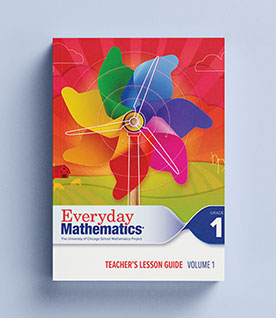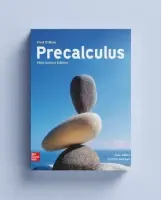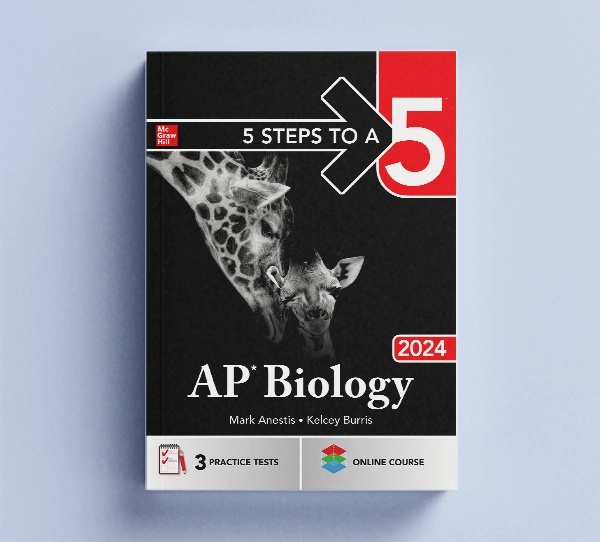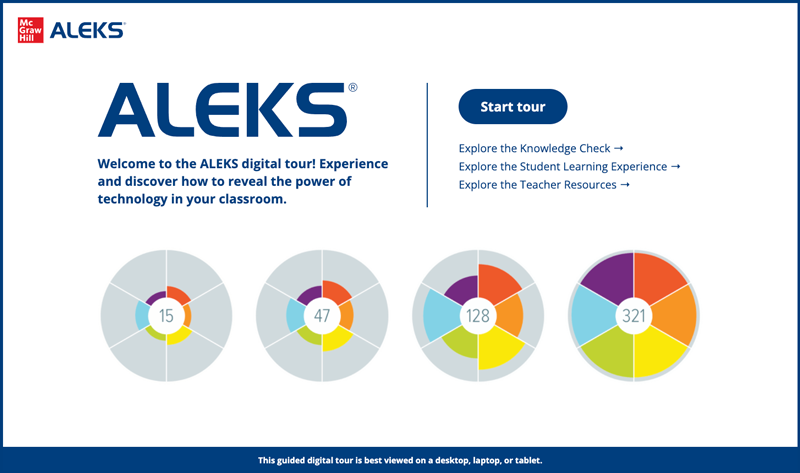Log In to My PreK-12 Platform

ALEKS: An Adaptive Math and Science Program for Grades 3–12
ALEKS (Assessment and Learning in Knowledge Spaces) is a web-based, artificially intelligent assessment and learning system for grades 3–12. ALEKS uses adaptive questioning to quickly and accurately determine exactly what topics a student knows and doesn’t know in a course. ALEKS then instructs each student on the topics they are most ready to learn.
ALEKS is purposefully designed to help educators:
- Identify instructional gaps.
- Personalize learning paths
- Track the progress of student learning and mastery
As a student works through a course, ALEKS periodically reassesses the student’s knowledge to ensure that topics learned are also retained. It’s an approach that has proven to create math confidence and measurable success for over 20 years.
ALEKS courses align with state and national standards, making it a perfect complement to any classroom environment. The proven technology of ALEKS can integrate with any system, anywhere, on any device.
To date, ALEKS has helped more than 20 million students at thousands of K–12 schools, colleges, and universities throughout the world.
ALEKS Programs
, Link will open in a new tab
The Power of Evidence-Based Learning
Developed by cognitive scientists
ALEKS was developed at the University of California by cognitive scientists, software engineers, mathematicians, and educators. It is the product of decades of research that was supported by the National Science Foundation. Its unique approach to instruction is based on Knowledge Space Theory, which holds that
Knowledge is not linear; it’s a complex web of interrelated topics.
Learners make unique connections within this web and navigate it differently.
Understanding how students learn is pivotal in creating individualized learning pathways that accelerate concept mastery
Click here for more information about the evidence behind ALEKS

Creating a Personalized Learning Experience for Students
Understanding the three-phase cycle within the student experience
The three-phase cycle of learning and assessment in ALEKS targets the unique needs of every student.

Assessment
Students begin with an Initial Knowledge Check to accurately measure what they know, don’t know, and what concepts they are ready to learn next. The results are summarized in the ALEKS Pie, a tool that provides insight on student knowledge across multiple topics. Within each pie slice (topic area), the colored section shows what a student knows. The gray area shows what the student has left to learn.

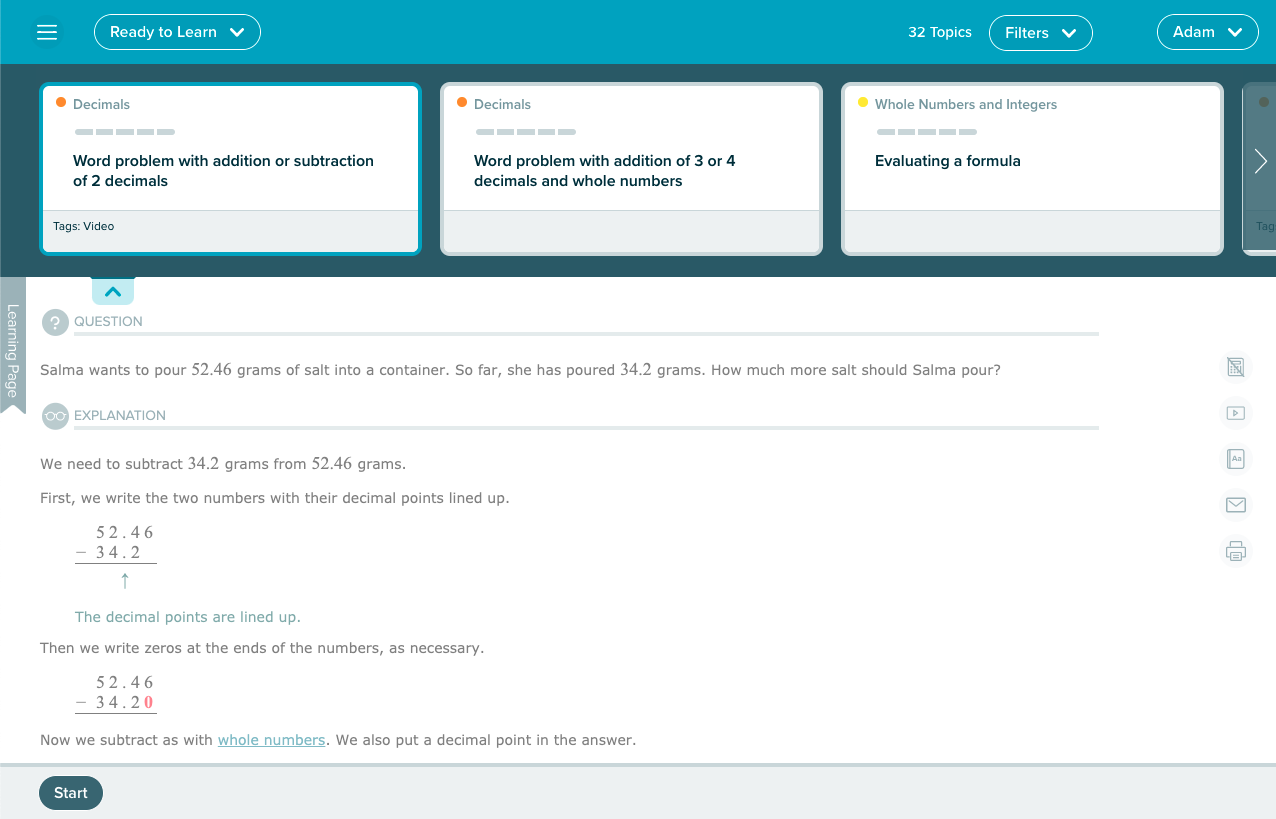
Personalized Learning
As students work through their ready-to-learn topics, ALEKS provides immediate feedback, detailed explanations, definitions, and other tools for building mastery.

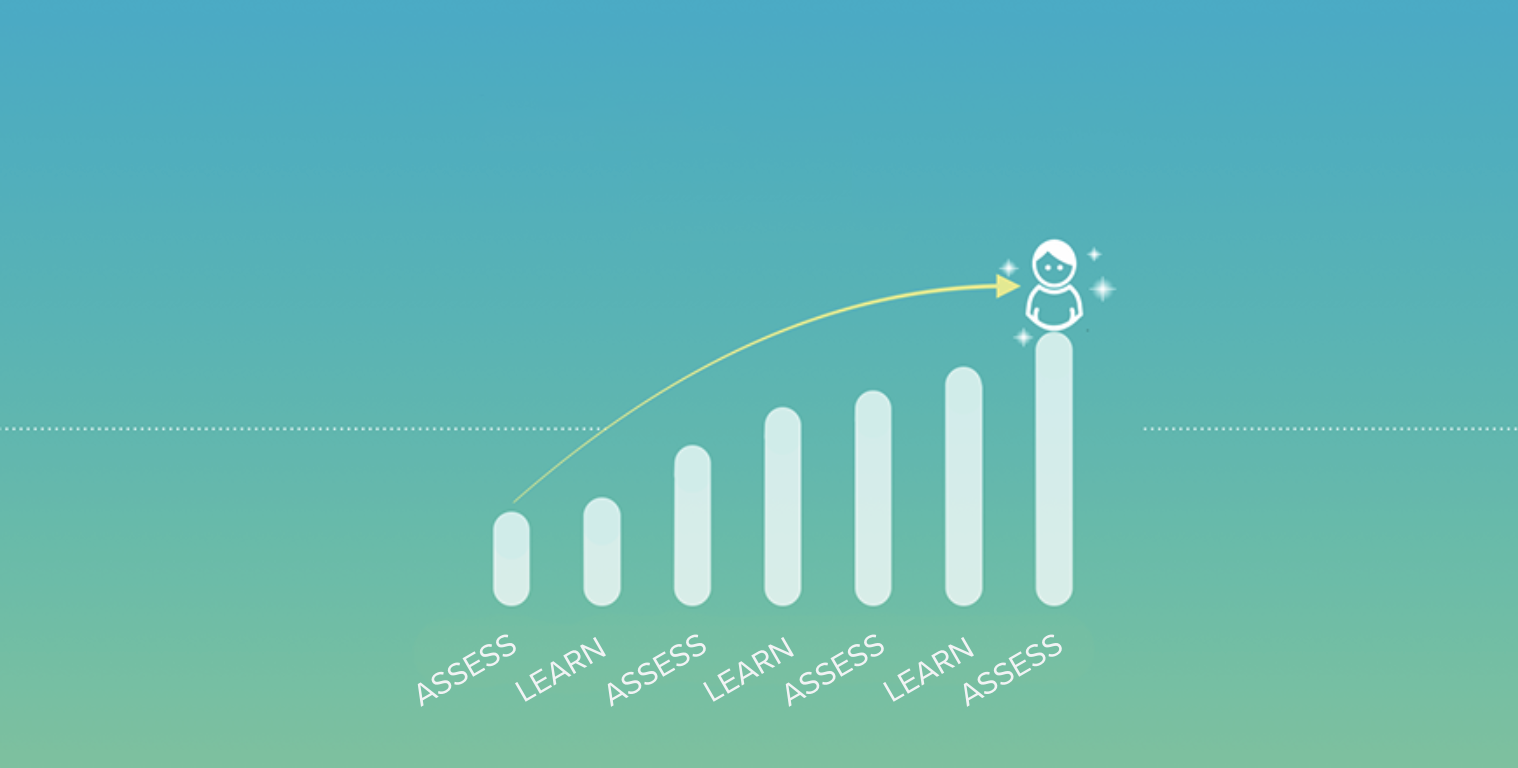
Continuous Reinforcement
As students learn new topics, ALEKS periodically rechecks their knowledge to ensure retention. The system then provides remediation for topics students have not successfully mastered.

Customization for Teachers
The flexibility to support any classroom model
All ALEKS courses for grades 3–12 deliver standards-based content correlated to state standards. By combining adaptive learning technology and comprehensive progress monitoring, ALEKS accommodates the unique learning styles of all students. This ensures that they are working on the exact skills needed to effectively prepare for standardized testing while setting them up for college and career success.
ALEKS also offers the flexibility you need to support your math instruction while still accommodating the unique individual needs of all your students with three instructional models:
Model 1
Truly Adaptive
This model is for the instructor who wants to maximize their use of the adaptive learning technology in ALEKS to encourage concept mastery and retention. Perfect for intervention, acceleration, or enrichment blocks.
Model 2
Customize Your ALEKS Course to Match Your Instruction
Perfect for blended learning, summer school, or credit recovery, this model benefits an instructor who requires mastery of prerequisite topics and the majority of course topics. This model allows you to use adaptive assignments as homework and the chapter reviews, tests, or exams from your core mathematics curriculum to assess mastery.
Model 3
Assign Lessons to Support Both Curriculum and Grade-Level Objectives
This model supports an instructor who prefers a balance of personalized learning and textbook-based assignments. Using the Initial Knowledge Check, you can identify any potential gaps in your students’ foundational knowledge and remediate them with adaptive prerequisite review assignments while using non-adaptive assignments as homework, quizzes, or exams.
ALEKS Reporting
ALEKS reports are designed to provide real-time data and summary reports to help students and teachers monitor usage, track progress, and identify areas of growth or areas where students could use additional support. The actionable data provided in these reports will help you plan for full-class and small-group instruction and intervene with individual students, as needed.
Progress Report
Using Progress Reports, you can view student progress on Knowledge Checks and in Learning Mode at various time intervals. These reports allow you to track student progress, see how well they are retaining new learning, and ensure they can get intervention when they need it the most.
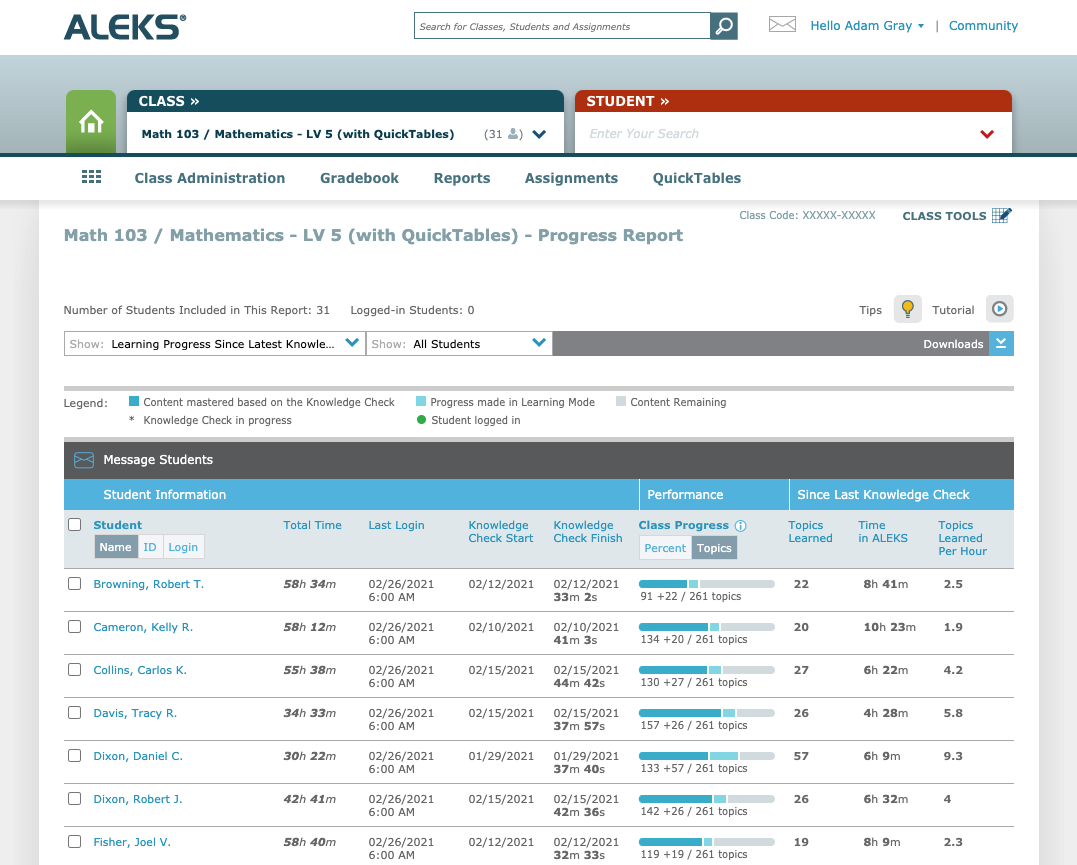
Time & Topic Report
This report allows you to monitor the amount of time individual students are spending on ALEKS Knowledge Checks, Learning Mode, and assignments. It also allows you to monitor the number of topics a student has attempted over a particular period of time and how many of those topics the student has learned.
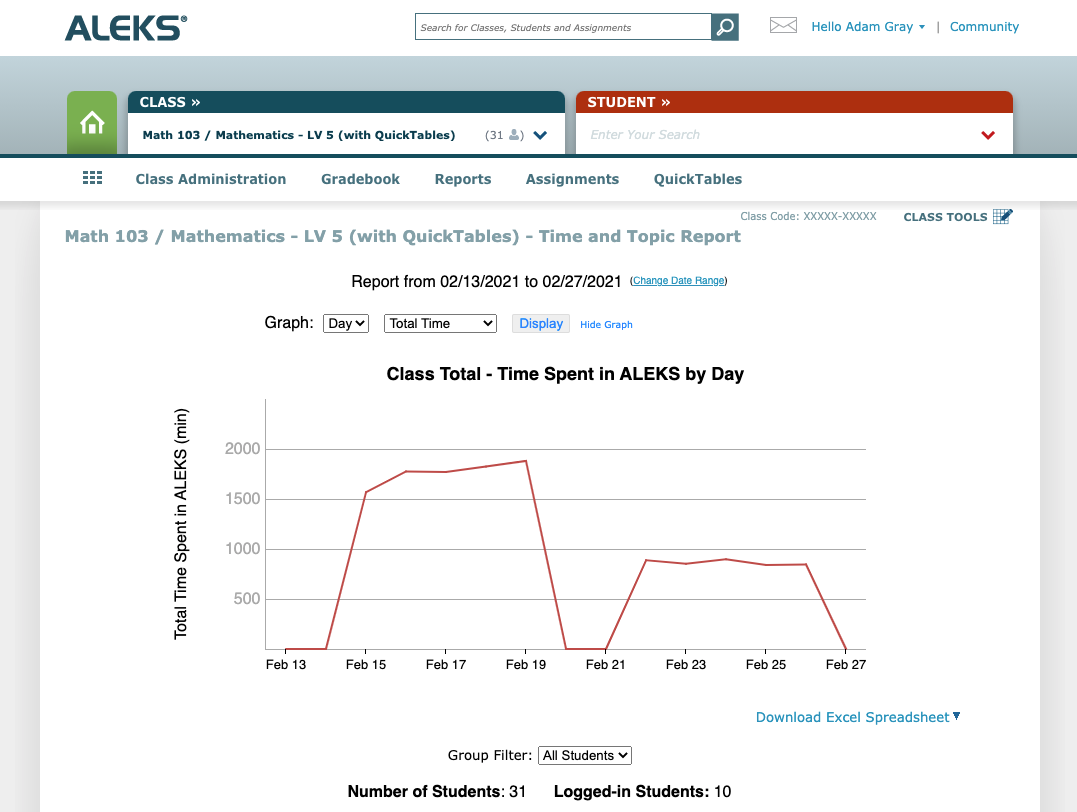
ALEKS Insights
ALEKS Insights alerts instructors when students might be at risk of falling behind so that immediate action can be taken. Insights identifies students exhibiting at least one of four adverse behaviors that may require intervention:
Failed Topics
, Link will open in a new tab
This report is updated in real-time to inform you if a student has attempted a topic multiple times without success. You can also select a student and message them from the Insights report to address their learning needs immediately.
Decreased Learning
, Link will open in a new tab
Identify when students might be “hitting a wall” and need additional help. This report alerts you when a student’s rate of learning has decreased significantly despite continual work in ALEKS.
Unusual Learning
, Link will open in a new tab
This report identifies students whose learning rate has increased significantly compared to their usual pace, which could signify that they may not be doing their own work.
Procrastination
, Link will open in a new tab
Stop procrastination in its tracks with this report that identifies students in ALEKS who are exhibiting extremely long periods of inactivity.
ALEKS Support
Whether you need help with implementation or are wanting professional development resources, ALEKS offers comprehensive customer support.
Implementation Team
The ALEKS implementation team provides support to educators throughout the entire implementation process from start to finish. The ALEKS implementation team also offers live trainings for new users. These trainings provide an overview of the ALEKS system, share best practices for use, answer questions about your ALEKS implementation, and provide a guided exploration through ALEKS on how to find and utilize its most commonly used features.
Customer Service
Have technical questions about ALEKS? Our expert customer support representatives are here to help! On our Support Page, you can find frequently asked questions, system requirements, and dates/times to reach us. ALEKS customer service is available seven days a week and offers extended hours on weekdays to help meet the needs of you and your students.
On-Demand Training
Our Training Center is your go-to place for on-demand resources—including user guides, videos, and printable tutorials on how to complete common tasks that you’ll be doing in ALEKS.














